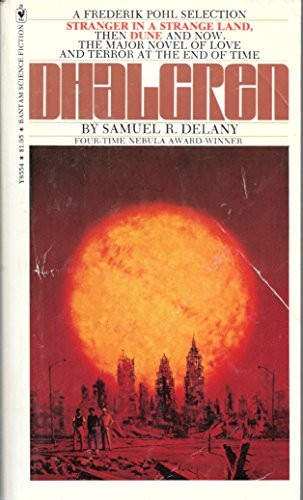nicknicknicknick@bookwyrm.social ha recensito Dhalgren di Samuel R. Delany
Dhalgren
3 stelle
1) "to wound the autumnal city. So howled out for the world to give him a name. The in-dark answered with wind. All you know I know: careening astronauts and bank clerks glancing at the clock before lunch; actresses cowling at light-ringed mirrors and freight elevator operators grinding a thumbful of grease on a steel handle; student riots; know that dark women in bodegas shook their heads last week because in six months prices have risen outlandishly; how coffee tastes after you've held it in your mouth, cold, a whole minute. A whole minute he squatted, pebbles clutched with his left foot (the bare one), listening to his breath sound tumble down the ledges. Beyond a leafy arras, reflected moonlight flittered. He rubbed his palms against denim. Where he was, was still. Somewhere else, wind whined. The leaves winked. What had been wind was a motion in brush below. His …
1) "to wound the autumnal city. So howled out for the world to give him a name. The in-dark answered with wind. All you know I know: careening astronauts and bank clerks glancing at the clock before lunch; actresses cowling at light-ringed mirrors and freight elevator operators grinding a thumbful of grease on a steel handle; student riots; know that dark women in bodegas shook their heads last week because in six months prices have risen outlandishly; how coffee tastes after you've held it in your mouth, cold, a whole minute. A whole minute he squatted, pebbles clutched with his left foot (the bare one), listening to his breath sound tumble down the ledges. Beyond a leafy arras, reflected moonlight flittered. He rubbed his palms against denim. Where he was, was still. Somewhere else, wind whined. The leaves winked. What had been wind was a motion in brush below. His hand went to the rock behind. She stood up, two dozen feet down and away, wearing only shadows the moon dropped from the viney maple; moved, and the shadows moved on her."
2) "Across the water the city flickered."
3) "This parched evening seasons the night with remembrances of rain. Very few suspect the existence of this city. It is as if not only the media but the laws of perspective themselves have redesigned knowledge and perception to pass it by. Rumor says there is practically no power here. Neither television cameras nor on-the-spot broadcasts function: that such a catastrophe as this should be opaque, and therefore dull, to the electric nation! It is a city of inner discordances and retinal distortions."
4) "'Which way does the sun come up?' Loufer chuckled. 'I know you won't believe this—' they walked again—'but when I first got here, I could have sworn the light always started over there.' As they stepped from the curb, he nodded to the left. 'But like you can see, today it's getting light—' he gestured in front of them—'there.' 'Because the season's changing?' 'I don't think it's changed that much. But maybe.' Tak lowered his head and smiled. 'Then again, maybe I just wasn't paying attention.' 'Which way is east?' 'That's where it's getting light.' Tak nodded ahead. 'But what do you do if it gets light in a different place tomorrow?' 'Come on. You could tell by the stars.' 'You saw how the sky was. It's been like that or worse every night. And day. I haven't seen stars since I've been here—moons or suns either.' 'Yeah, but—' 'I've thought, maybe: It's not the season that changes. It's us. The whole city shifts, turns, rearranges itself. All the time. And rearranges us...' He laughed. 'Hey, I'm pulling your leg, Kid. Come on.'"
5) "What is this part of me that lingers to overhear my own conversation? I lie rigid in the rigid circle. It regards me from diametric points, without sex, and wise. We lie in a rigid city, anticipating winds. It circles me, intimating only by position that it knows more than I want to. There, it makes a gesture too masculine before ecstatic scenery. Here, it suggests femininity, pausing at gore and bone. It dithers and stammers, confronted by love. It bows a blunt, mumbling head before injustice, rage, or even its like ignorance. Still, I am convinced that at the proper shock, it would turn and call me, using those hermetic syllables I have abandoned on the crags of a broken conscience, on the planes of charred consciousness, at the entrance to the ganglial city. And I would raise my head. 'You...' he said, suddenly. It was dark. 'Are you happy, I mean, living like this?' 'Me?' She breathed a long breath. 'Let me see... before I came here, I was teaching English to Cantonese children who'd just arrived in New York's Chinatown. Before that, I was managing a pornographic bookstore on 42nd Street. And before that, for quite a while, I was a self-taught tape-jockey at WBAI-FM, in New York, and before that, I was doing a stint at her sister station KPFA, in Berkeley, Cal. Babes, I am so bored here that I don't think, since I've come, I've ever been more than three minutes away from some really astonishing act of violence.' And suddenly, in the dark, she rolled against him."
6) "'When it began, I mean after it began—first we thought that whole side of the city was on fire—after we could see what it was—' he shook his head at somebody who started a comment—'no, no, I don't know what the fuck it was. Don't ask me. After we could see it, we went up the steps to watch. Didn't we?' Dragon Lady sat, smiling and shaking her head, which, when she noticed the shift of attention, changed to nodding: the smile stayed. 'We just climbed up there and watched the whole thing. Go up. And go down.' Nightmare whistled. 'Jesus Christ!' We live, Kid thought; and die in different cities."
7) "Kamp laughed. 'I'm dissatisfied with my life on earth. How's that? Not clear, I guess. Look—I'm not the same person I was before I went to the moon—maybe this is the sort of thing you were asking about. Perhaps it's the sort of thing that should only be told to one person. But I've told a couple of dozen: You know the world is round, and that the moon is a small world circling it. But you live in a world of up and down, where the land is a surface. But for me, just the visual continuity from that flat surface to a height where the edge of the earth develops a curve, to where that curve is a complete circle, to where the little soap-colored circle hanging in front of you enlarges to the size the Earth was, and then you come down. And suddenly that circle is a surface—but up and down is already not quite the same thing. We danced when we got out on the moon. What else could we do with that lightness? You know, seeing a film backward isn't the same experience as seeing it forward in reverse. It's a new experience, still happening forward in time. What falls out is all its own. Returning from the moon was not the same as going, played backward. We arrived at a place where no one had walked; we left a place where we had danced. The earth we left was peopled by a race that had never sent emissaries to another cosmological body. We returned to a people who had. I really feel that what we did was important—folks starving in India notwithstanding; and if there's a real threat of world starvation, technology will have to be used to avoid it; and I can't think of a better way to let people know just how far technology can take us. I was at a point of focus, for six and a half hours. I'm happy with that focus. But I'm not too terribly satisfied with the life on either side. The things that are off are like the things off about the way Bellona looked when we were driving through the first day I got here: there aren't many people, but there's no overt signs of major destruction—at least I didn't see any. It's grey, and some windows are broken, and here and there are marks of fire. But, frankly, I can't tell what's wrong. I still haven't been able to figure out what's happened here.' 'I'd like to go to the moon.' 'Cut your hair and stop taking dope.'"
8) "They play me into violent postures. Adrift in the violent city, I do not know what stickum tacks words and tongue. Hold them there, cradled on the muscular floor. Nothing will happen. What is the simplest way to say to someone like Kamp or Denny or Lanya that all their days have rendered ludicrous their judgments on the night? I can write at it. Why loose it on the half-day? Holding it in the mouth distills an anger dribbling bitter back of the throat, a substance for the hand. This is not what I am thinking. This is merely (he thought) what thinking feels like."
9) "At Bunny's gesture, Kid closed the door. 'Thank you, thank you. A million times, thank you. I've got to run along to greet my audience with—' Bunny thrust out a hip and closed an eye— 'the real thing. You're a perfect love. Ta-ta!' Halfway up the hall Bunny turned back and flung out one hand while the other wound among the optic beads. 'And have a fabulous time at your party. You were too good to ask me. Thank you, thank you. You really are too good. Drink a glass of champagne for old Bun-buns, and remember, whatever happens, give 'em hell!'"
10) "The falsification of this journal: First off, it doesn't reflect my daily life. Most of what happens hour by hour here is quiet and dull. We sit most of the time, watch the dull sky slipping. Frankly, that is too stupid to write about. When something really involving, violent, or important happens, it occupies too much of my time, my physical energy, and my thought for me to be able to write about. I can think of four things that have happened in the nest I would like to have described when they occurred, but they so completed themselves in the happening that even to refer to them seems superfluous. What is down, then, is a chronicle of incidents with a potential for wholeness they did not have when they occurred; a false picture, again, because they show neither the general spread of our life's fabric, nor the most significant pattern points. To show the one is too boring and the other too difficult. That is probably why (as I use up more and more paper trying to return the feeling I had when I thought I was writing poems) I am not a poet... anymore? The poems perhaps hint it to someone else, but for me they are dry as the last leaves dropping from the burned trees on Brisbane. They are moments when I had the intensity to see, and the energy to build, some careful analog that completed the seeing. They stuck at me for two weeks? For three? I don't really know if they occurred. That would take another such burst. All I have been left is the exhausting habit of trying to tack up the slack in my life with words."

